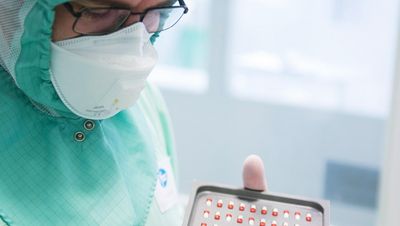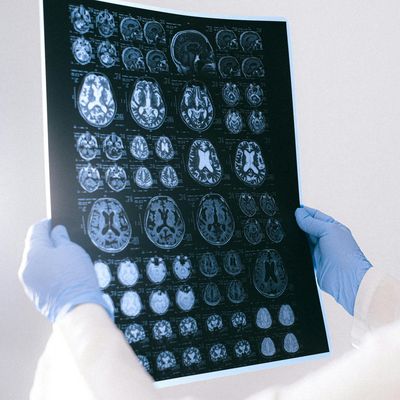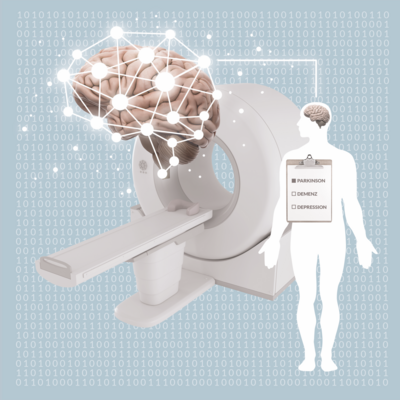“Our need for IT experts is continually growing”

Digitalization is having a rapid impact in the field of medicine, with data sciences and AI offering ever-increasing benefits for the development of new vaccines and drugs. Pfizer manager Peter Albiez discusses how graduate schools like HEIBRiDS are helping meet the enormous demand for specialists in the data sciences.
The HEIBRiDS graduate school provides training for talented young researchers at the interface between a scientific discipline and the data sciences. What significance do the data sciences and artificial intelligence have now for your field, the pharmaceutical industry?
They are particularly important. Digitalization is set to play a major role in shaping medicine in the future. Basically, this future has already begun and is progressing at an incredible pace. Research and development are now capable of collecting massive volumes of data and assessing them using modern methods of analysis, based on artificial intelligence and machine learning. This lets us reveal hidden patterns in the data so we can use them as the basis for developing precise medical solutions with tailored diagnostics and therapies. In other words, this is a huge new field that’s revolutionizing medicine—data science is one of the key competences of the future. Without it, we wouldn’t be able to shape the future of medicine.
Can you give us an example of this?

Our interview partner Peter Albiez from Pfizer Germany
Peter Albiez - Pfizer
Peter Albiez was chairman of the board at Pfizer Germany for six years and has been heading up the Patient and Physician Engagement transformation project at Pfizer International since April 2021. This project aims to tap into the possibilities that digitalization offers the field of medicine and harness their potential. Albiez is also a member of the Supervisory Board at the Max Delbrück Center for Molecular Medicine MDC and spokesperson for the Berlin-Brandenburg Healthcare Industries Cluster.

The development of our coronavirus vaccine, which we expedited in a record time of ten months together with BioNTech, would have taken much longer without these new digital tools. A total of 44,000 participants were involved in the clinical studies worldwide. An important aspect here was recording the data in a way that allowed us to analyze them quickly, ideally in real time. Normally, it would have taken 30 days for us to verify all the data and make them available for the scientific analysis. But thanks to a new machine learning tool called Smart Data Query, we were able to review the data from the clinical studies in just 22 hours—an enormous acceleration. Data science was also important when it came to producing and distributing the vaccine, though. For example, real time data capture let us pinpoint potential supply shortages early on and then take steps to address them in good time.
What types of specialists are needed for tasks like this? And what role can programs like HEIBRiDS play; that is, graduate schools that specialize in providing interdisciplinary training for talented young people in the field of data science?

The HEIBRiDS Graduate School
HEIBRiDS
At the Helmholtz Einstein International Berlin Research School in Data Science, the study of data science has a broad horizon: HEIBRiDS brings together six Helmholtz centers and four university partners from the Einstein Center Digital Future (ECDF), which focuses on core digitization technologies, from digital health to digital industry and the digital humanities. The participating Helmholtz centers have world-class expertise in molecular medicine, astrophysics, polar and marine research, aerospace, materials science and geosciences.
Read more about the research at HEIBRiDS:

Expertise of this type is becoming more and more relevant all the time. This is particularly true in terms of research, but also for production and logistics, and thus the entire value chain—after all, every area of a company stands to benefit from digitalization. So our need for IT experts is continually growing, and we’re very interested in attracting talented people who have already acquired this expertise in the course of their academic career. So far, we’re getting many of these young experts from the US and Asia. But I think we should be devoting more attention to these skills in Germany and Europe as well. And that’s why I see an initiative like HEIBRiDS as trendsetting in terms of developing a pool of talented people. Besides this, enhancing the interplay between science and the economy in the region is especially important to me in my role as a member of the Supervisory Board at MDC and spokesperson for the Berlin-Brandenburg Healthcare Industries Cluster. We have so many excellent companies here, both startups and large corporations. I’m very interested in keeping collaborations like these moving forward. And it goes without saying that the same applies to attracting up-and-coming talent who have something to offer not just in the sciences but also to businesses thanks to their expertise. In this respect, the HEIBRiDS graduate school makes a key contribution to the health economy in our region.
“Going forward, the team here at HEIBRiDS also wants to bring more international computer science firms on board.”
Uwe Ohler from MDC is the spokesperson for HEIBRiDS. He tells us more about the graduate school and its plans for the future in our school portrait.
In what areas of medicine could data science be especially relevant in the future?
One of our focus areas is rare diseases. It’s true that only a relatively small number of people are affected in each case. But because there are around 7,000 such diseases, they do end up affecting a very large number of people. These diseases often stem from genetic changes, involve a lot of suffering, and lead to significant health impairments. By collecting large volumes of data and analyzing them using methods such as machine learning, we’ll become more and more capable of identifying these diseases and treating them in a targeted way, for example using gene therapies. This approach will enable us to overcome diseases that we haven’t been able to diagnose or treat so far, step by step.


Comprehensive, high-quality datasets are the basis for these types of applications. How can this high level of data quality be ensured?
A key factor is creating the right basic conditions so we can collect data systematically. This is a task that can be carried out by data trust centers, for example, which define the requirements for the data but also ensure data security is guaranteed. Data protection has to be upheld; that’s something we all want. At the same time, we should design it in such a way that scientific institutions and companies conducting research have adequate access to medically relevant data. Only then will they be able to develop drugs which can be used to treat diseases that are still incurable. In this respect, those of us here in Germany need more courage and willingness to shape the future of digital medicine. The MDC is on a really good track here with training initiatives like HEIBRiDS—because doctoral candidates aren’t just gaining data science skills but also an awareness of how to handle research data.
Interview: Frank Grotelüschen









